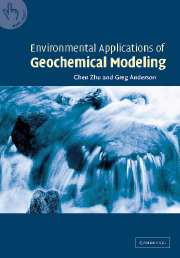Book contents
- Frontmatter
- Contents
- Preface
- 1 Introduction
- 2 Model Concepts
- 3 Thermodynamic Background
- 4 Computer Programs for Geochemical Modeling
- 5 Preparation and Construction of a Geochemical Model
- 6 Speciation and Solubility Modeling
- 7 Modeling Surface Adsorption
- 8 Reaction Path Modeling
- 9 Inverse Mass Balance Modeling
- 10 Coupled Reactive Transport Models
- 11 Kinetics Modeling
- Appendix
- References
- Index
2 - Model Concepts
Published online by Cambridge University Press: 27 March 2010
- Frontmatter
- Contents
- Preface
- 1 Introduction
- 2 Model Concepts
- 3 Thermodynamic Background
- 4 Computer Programs for Geochemical Modeling
- 5 Preparation and Construction of a Geochemical Model
- 6 Speciation and Solubility Modeling
- 7 Modeling Surface Adsorption
- 8 Reaction Path Modeling
- 9 Inverse Mass Balance Modeling
- 10 Coupled Reactive Transport Models
- 11 Kinetics Modeling
- Appendix
- References
- Index
Summary
Model Definitions
Voltaire once said “If you wish to discuss with me, define your terms”. This seems like a reasonable place to begin; nevertheless, there is always considerable disagreement on the precise definition of complex ideas, and it is often better to accept some imprecision and disagreement, and to get on with the job at hand. We present some brief definitions here simply to clarify the present state of geochemical modeling.
Models
A National Research Council report on groundwater modeling (National Research Council, 1990, p. 52) states that a hydrogeological model comprises three major components:
specific information describing the system of interest;
the equations that are solved in the model; and
the model output.
These are all necessary components for a geochemical model as well, but geochemical models also have one additional component: the equilibrium and kinetic prescriptions for chemical reactions among the chemical components of concern.
In this book we use the term model in a more restricted but more precise way. In our sense:
A model is an abstract object, described by a set of mathematical expressions (including data of various kinds) thought to represent natural processes in a particular system. The “output data”, or the results of the model calculations, generally are quantities which are at least partially observable or experimentally verifiable. In this sense the model is capable of prediction.
As will become clear in later discussions, this definition leaves something to be desired, in the sense that it suggests that a model is just a bunch of equations, whereas in fact we make a distinction between computer programs and models.
- Type
- Chapter
- Information
- Environmental Applications of Geochemical Modeling , pp. 18 - 31Publisher: Cambridge University PressPrint publication year: 2002



